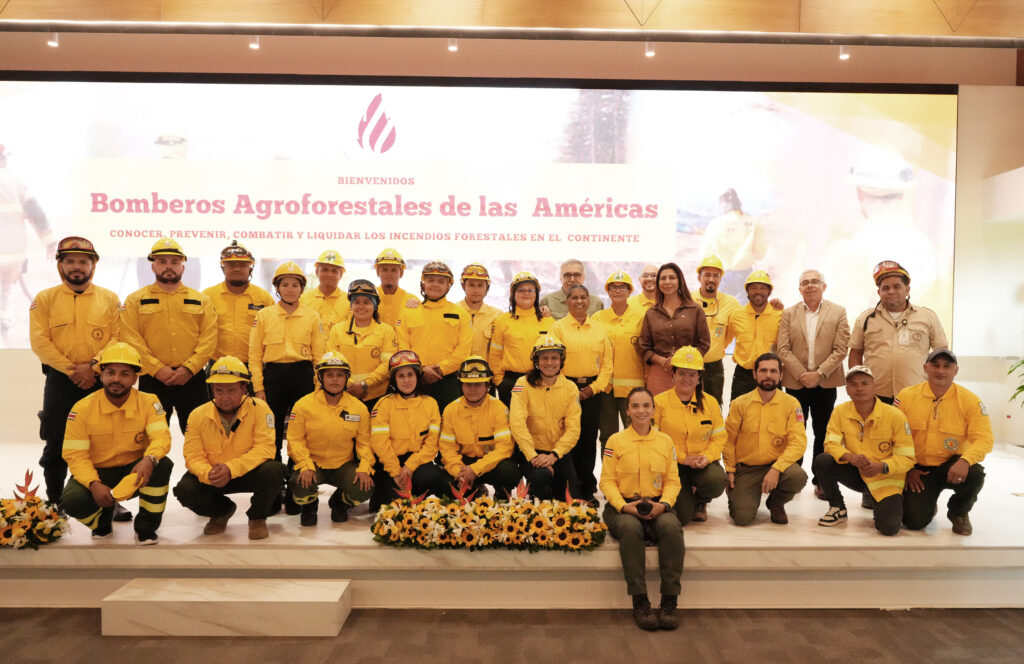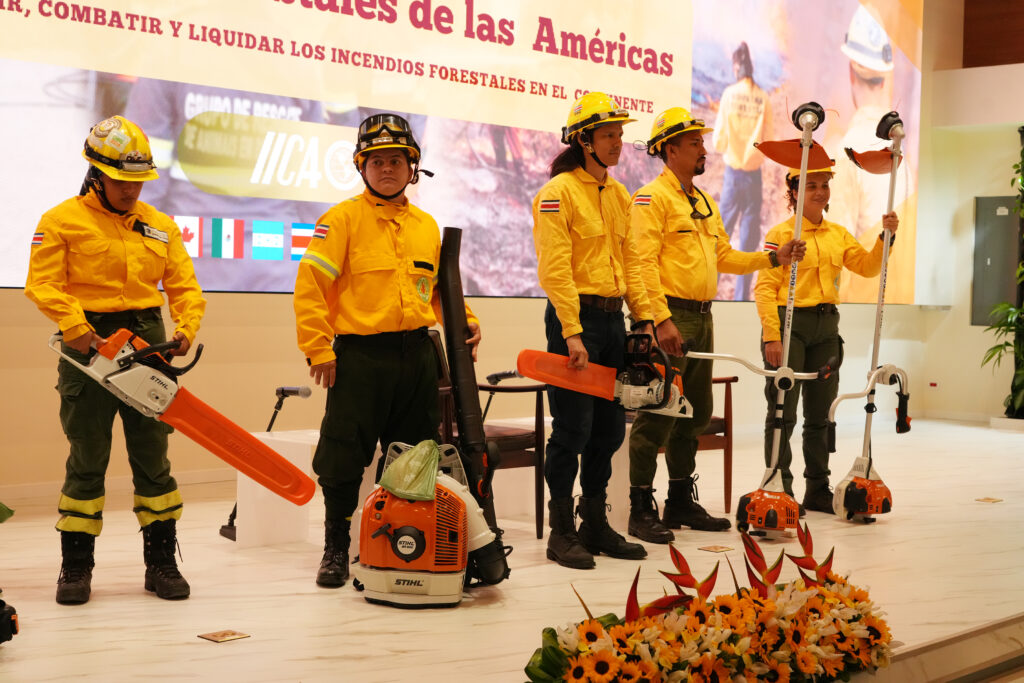At the launch, the Institute donated mechanical tools to Costa Rican firefighters to combat wildfires, which in 2024 affected close to 2.24% of the total land area of the Americas.

San Jose, 26 August 2025 (IICA) – The Inter-American Institute for Cooperation on Agriculture (IICA) launched the hemispheric initiative “Agroforestry Firefighters of the Americas”, an innovative program designed to educate; prevent and combat forest fires in the region; and to avert the disasters that they trigger.
The initiative will be implemented in countries such as Brazil, Canada, Chile, Costa Rica, Honduras, Mexico and Uruguay, seeking to bridge the gaps in knowledge, prevention, rapid response and community resilience against forest fires.
It will provide training, technology and specialized equipment and will also actively promote community participation, in a bid to provide the framework for coordination with national, subnational and local government agencies.
The launch of the initiative took place at IICA Headquarters in Costa Rica, with national authorities, members of the accredited diplomatic corps in the country and the Director General of the Institute, Manuel Otero, in attendance.
Alejando Solano, Deputy Minister of Multilateral Affairs of the Ministry of Foreign Affairs and Worship of Costa Rica, noted that “Agroforestry Firefighters of the Americas” supports the commitment to familiarize firefighters with technology that will equip them to tackle fires more effectively, for example, by using drones, which can make a marked difference in firefighting and surveillance efforts and in ensuring the optimal deployment and safety of personnel.
Solano said, “We would like to thank IICA for this program that demonstrates its commitment to technology innovation, local capacity development and environmental conservation, which contribute to the sustainability of rural areas of the Americas. Costa Rica will continue to actively cooperate in an international plan, sharing best practices, providing support in moments of crisis, and promoting learning, because fires do not respect borders and the protection of the planet is a shared responsibility”.
Otero noted that, “IICA’s actions reflect its commitment to ensure the welfare of our rural communities, food security and the environmental sustainability of the hemisphere”.
The Director General of the Institute invited governments, organizations and strategic partners to join the initiative, “to protect our land, resources and communities, as this is something that can’t wait”.
During the event, IICA donated mechanical firefighting equipment to the Costa Rican firefighters, such as chainsaws, brush cutters, machetes and blowers.

María Luisa Arias, a forest firefighter in the Guanacaste Conservation Area said: “A million thanks to IICA and to Manuel Otero for this initiative, which is extremely important to us, given the wildfire problem in Guanacaste. This equipment will be very useful in controlling it. We have been receiving training from IICA for many years and are very advanced in other issues such as the conservation of protected areas”
Jonathan Castro, Coordinator of IICA’s Digital Fabrication Lab, indicated that the program is funded by IICA’s Hemispheric Fund for Agricultural Resilience and Sustainability (FoHRSA), which was created in 2024 at the request of the ministers of Agriculture of the Americas.
In addition to the launch, the Institute conducted a three-day workshop at its Headquarters, in coordination with the Costa Rica Red Cross, training more than 30 firefighters on the Incident Command System.

Alejandro Solano, Deputy Minister of Multilateral Affairs at Costa Rica’s Ministry of Foreign Affairs and Worship.
Impact of forest fires in the Americas
According to Global Wildfire Information System (GWIS) data, which was shared at the launch of the hemispheric program, in 2024 wildfires affected 952,074.53 km² throughout the Americas, which is equivalent to 2.24% of its total surface area.
The impact is not limited to forests. The fires also destroy grasslands, scrubland, pastures and cultivated areas. Based on the GWIS data, it can be estimated that six million hectares of arable land throughout the Americas were affected in 2024, which is an alarming figure that highlights the sheer scale of this environmental challenge.
Manuel Otero stressed that, “When fires of this magnitude occur, we are losing biodiversity. They emit massive amounts of contaminating gases and result in soil erosion. Without soil there can be no agriculture, and life cannot be sustained without agriculture. We want to translate this concern into a call for technical cooperation, producing solutions that transcend borders”.

Manuel Otero, IICA Director General.
Margarita Portuguez, the Ambassador of the Republic of Chile in Costa Rica, who also participated in the event, stressed the importance of coordination among governments, communities, volunteers and the private sector, to tackle large-scale natural disasters.
Portuguez emphasized the need to build resilience and learn from experiences, for which international cooperation is critical. “For Chile—she said—this initiative is particularly valuable and is an area in which we can continue to strengthen diplomatic efforts”.
The name “Agroforestry Firefighters of the Americas” reflects the close connection between forest fires and poor agricultural practices. Fires not only destroy forest areas but also affect ecosystems that ensure the food security of the hemisphere.
More information:
Institutional Communication Division.
comunicacion.institucional@iica.int











